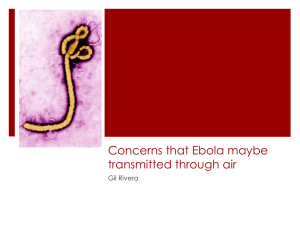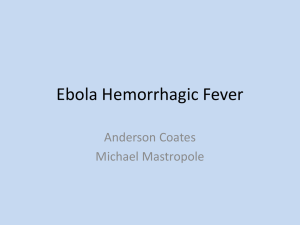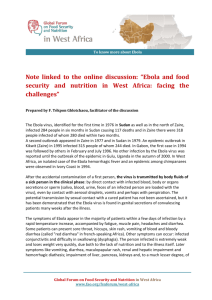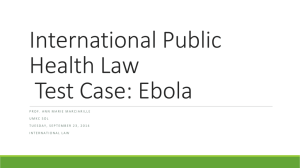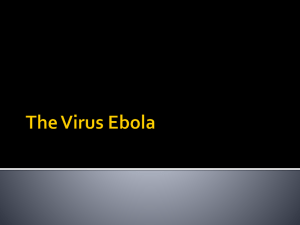here - Cardiff University
advertisement
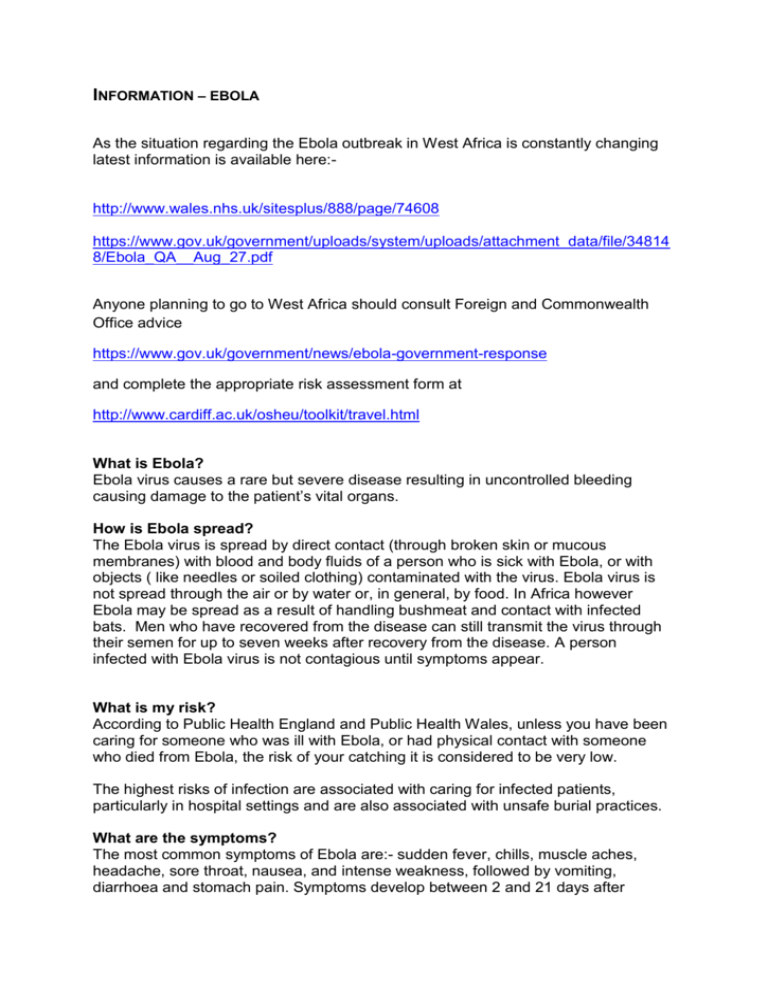
INFORMATION – EBOLA As the situation regarding the Ebola outbreak in West Africa is constantly changing latest information is available here:- http://www.wales.nhs.uk/sitesplus/888/page/74608 https://www.gov.uk/government/uploads/system/uploads/attachment_data/file/34814 8/Ebola_QA__Aug_27.pdf Anyone planning to go to West Africa should consult Foreign and Commonwealth Office advice https://www.gov.uk/government/news/ebola-government-response and complete the appropriate risk assessment form at http://www.cardiff.ac.uk/osheu/toolkit/travel.html What is Ebola? Ebola virus causes a rare but severe disease resulting in uncontrolled bleeding causing damage to the patient’s vital organs. How is Ebola spread? The Ebola virus is spread by direct contact (through broken skin or mucous membranes) with blood and body fluids of a person who is sick with Ebola, or with objects ( like needles or soiled clothing) contaminated with the virus. Ebola virus is not spread through the air or by water or, in general, by food. In Africa however Ebola may be spread as a result of handling bushmeat and contact with infected bats. Men who have recovered from the disease can still transmit the virus through their semen for up to seven weeks after recovery from the disease. A person infected with Ebola virus is not contagious until symptoms appear. What is my risk? According to Public Health England and Public Health Wales, unless you have been caring for someone who was ill with Ebola, or had physical contact with someone who died from Ebola, the risk of your catching it is considered to be very low. The highest risks of infection are associated with caring for infected patients, particularly in hospital settings and are also associated with unsafe burial practices. What are the symptoms? The most common symptoms of Ebola are:- sudden fever, chills, muscle aches, headache, sore throat, nausea, and intense weakness, followed by vomiting, diarrhoea and stomach pain. Symptoms develop between 2 and 21 days after becoming infected with the virus. Remember, other diseases (e.g. flu, malaria, typhoid fever) have similar symptoms, and only doctors can diagnose what the illness is. If you have not been to West Africa and specifically the countries affected by the current ourtbreak (Guinea, Liberia, or Sierra Leone), it is unlikely to be Ebola, but you may still require medical treatment. What should I do if I have such symptoms? Public Health England advise that if you experience the listed symptoms and have recently returned from West Africa, you should stay where you are and telephone 999 or 08454647 and explain that you are unwell and have recently visited West Africa. The medical services will provide advice and arrange for you to be taken to hospital if necessary to establish the cause of your illness. Note: Staff and students who have only recently come to the UK and who have not yet registered with a General Practitioner (GP) should still use the NHS if they experience such symptoms. Someone becoming ill in a Hall of Residence If you experience any of the symptoms of Ebola and have recently arrived from West Africa, you should isolate yourself and call 02920 402 2478 stating that you are a student returning from West Africa and that you are unwell, if possible let halls of residence staff know by phone that you are unwell. Where possible let flat-mates know. Prevent other people coming in contact with your bodily fluids (e.g. if you vomit), and make sure you inform people of your recent travel history. Guidance to hall staff is as follows 1. 2. Isolate the student in a room separate from others (if at all possible); Telephone the local Health Protection Team on 029 2040 2478 stating you are with a University student who has recently visited West Africa and that they are unwell. The Team will then advice on how to proceed. Is there anything I can do to protect myself and others? As with all infectious illnesses, washing your hands thoroughly with warm soapy water is the first step in protecting yourself. Follow general good hygiene rules, washing your hands before you eat and after you have been to the toilet, wash any raw food you consume, cough and sneeze into a tissue, and throw this away immediately – and then wash your hands. Maintain your immune system by eating healthily, and get sufficient sleep – you are more likely to fall ill if you are tired and run down. EBOLA AND THE NORMAL CONDUCT OF University BUSINESS Travel and Fieldwork in affected areas Staff and students who are in West Africa should monitor the situation in case it deteriorates, and stay in touch with colleagues or supervisors. Follow the advice and guidance at :https://www.nathnac.org/pro/clinical_updates/ebola_westafrica_200814.htm A number of air carriers have suspended flights from affected countries, so make sure you consider onward travel arrangements. There have been reports of panic buying of soap and cleaning products – there may be disruptions to other parts of the supply chain, for example to imports, if borders are closed. Check with your insurer about repatriation, and let them know whether you are a national of the country you are in. Try to avoid areas where the disease is known to be prevalent. Travel and Fieldwork – planning for future trips to the area Anyone planning to go to West Africa should consult Foreign and Commonwealth Office advice https://www.gov.uk/government/news/ebola-government-response and complete the appropriate Risk Assessment form at http://www.cardiff.ac.uk/osheu/toolkit/travel.html What is the policy on Staff, Students and visitors coming from affected countries? Cardiff University welcomes staff, students and visitors from all countries and has no intention of imposing any quarantine period or other restriction on those coming from countries affected by Ebola. Further Advice on humanitarian aid workers Public Health Wales has issued advice to humanitarian aid workers for before, during and after they visit an Ebola-affected area in West Africa, information is available by following this link: http://www.wales.nhs.uk/sitesplus/888/page/74608

